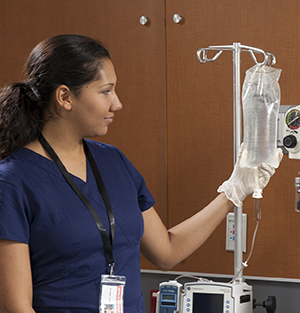Deciding About Artificial Hydration
When you have a serious illness, your health care provider will review treatment options with you as your illness progresses. Some of these treatments help support or sustain life if your body can no longer do certain functions on its own. Artificial hydration is one such treatment. It supplies fluids to your body if you can no longer take in fluids by mouth. Here's more about artificial hydration and what you need to know when deciding about this treatment.

How is artificial hydration given?
Artificial hydration is given using a thin tube called an IV (intravenous) line. To insert the line, a health care provider puts a small needle through the skin into a vein, most often in the arm or hand. Fluids are then sent through the line into the body.
What are the risks of artificial hydration?
Risks include bleeding and infection at the IV site. Too much fluid can build up in the body. This can cause uncomfortable swelling in the arms, legs, and belly. Fluid can also build up in the lungs, which can cause trouble breathing and shortness of breath.
What happens if I choose to have artificial hydration?
You will continue to receive fluids to help your body function. This may increase comfort and improve quality of life for some time. If you are near the end of your life, you may find it hard to tolerate the problems that can occur with this treatment. In this case, your provider may advise against artificial hydration if it's too much of a burden on your body, or if it will not prolong life or provide comfort.
What happens if I choose not to have artificial hydration?
If you choose not to have this treatment, you will continue to receive comfort care. This involves measures to ease pain and other symptoms. Without enough fluids, the body will slowly shut down. Death will occur within a few days or weeks. You may find it reassuring to know that dehydration is a natural part of the dying process. Studies show that most people near the end of life don't typically feel thirst. Dry mouth is a more common problem. This can be relieved by keeping the lips and mouth moist. Ice chips and small sips of water can also be given, if desired. In the last days of life, dehydration may help trigger the release of chemicals in the brain that can leave you with a sense of calm and well-being. This may help you pass your final hours in greater comfort.
How do I decide if I want artificial hydration?
Your provider and other members of your health care team can tell you more about artificial hydration and what it means for you. If you want, you may include family and friends in these discussions. As you make your decision, here are some things to think about or ask your team:
-
Will my illness improve? Or will it get worse? How likely is a cure?
-
How will artificial hydration affect my health? Will having the treatment change the outcome of my illness?
-
What are the risks and benefits of artificial hydration? And what problems can it cause? Will I be able to live with these problems?
-
How will artificial hydration affect my comfort and quality of life?
Consider your own values or faith. Also ask for advice from those who share your values.
Note
If you're having trouble deciding about artificial hydration, ask your provider if you can try it for a short time to see if it helps you feel better. You may later choose whether to continue or stop the treatment.
How do I tell others my decision about artificial hydration?
You can make your decision known by telling your provider directly. It's best to also put your treatment wishes in writing with advance directives. These are legal forms related to health care decisions. Laws about advance directives vary from state to state. Ask your provider about what forms are needed to make sure your wishes will be followed. Some common forms include:
-
A durable power of attorney for health care or health care proxy form. This form allows you to name a person to make treatment decisions on your behalf when you can't. This person is often called a health care proxy, medical or health care power of attorney, surrogate decision-maker, or agent.
-
A living will. This form tells others the kinds of treatment you want or don't want if you become too ill or injured to speak for yourself.
Keep in mind that you can change or cancel an advance directive at any time. Make it a practice to review your decisions each time there is a change in your health or goals of care. Be sure to tell your health care proxy and loved ones of any changes in your decisions.
Helping a loved one
Ideally, the decision about artificial hydration is made with the patient's consent. But in some cases, the decision falls to the patient's health care proxy or another adult. If you need to decide about artificial hydration for a loved one, start by talking with their health care provider. Discuss the goals of care and the benefits and burdens of the treatment on your loved one's health. Also think about your loved one's wishes and values. If needed, seek advice from other health care team members, such as a social worker or spiritual adviser.